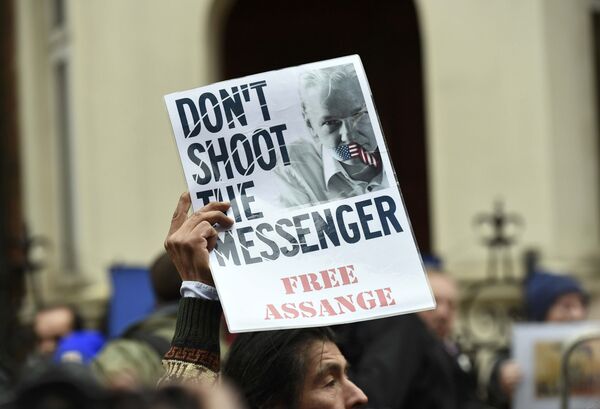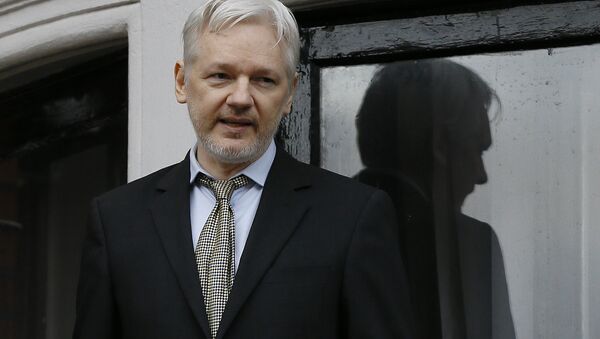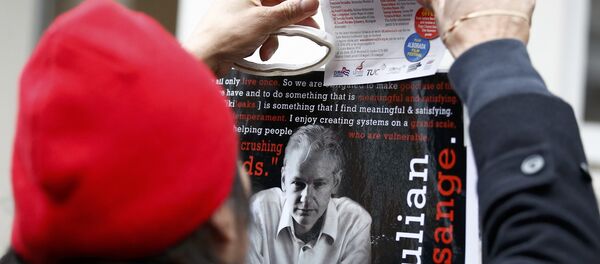Upon Marianne Ny's landmark announcement, an ebullient Assange took to Twitter to tweet his beaming visage, and his Swedish lawyer, Per Samuelsson, told local media the development was a "total victory," which meant Assange was "free to leave the embassy whenever he wants."
— Julian Assange (@JulianAssange) May 19, 2017
However, any champagne corks that may have detonated in the hours following Ny's declaration almost certainly did so prematurely. London's Metropolitan Police were quick to issue a statement of their own, saying the force remained "obliged" to execute an arrest warrant issued in 2012 by Westminster Magistrate's Court after Assange failed to surrender to authorities. In other words, Assange will still be arrested if he leaves the embassy — he remains wanted in the UK, albeit for a much less serious offense.
Why the UK just blew £10 million sieging #Assange http://t.co/OnHdmrg0wx http://t.co/8b8Pyk3tZS pic.twitter.com/kwncd7iGyd
— WikiLeaks (@wikileaks) February 5, 2015
While the building is no longer subject to 24/7 police surveillance — forces were withdrawn in 2015, after controversy over the escalating cost of the exercise, believed to run to tens of millions of pounds — the super-recognizable Assange likely wouldn't get far in the streets of Knightsbridge before being collared.
In any event, Assange isn't likely to attempt to visit Harrods or Hyde Park — the very reason he sought asylum in the Ecuadorian Embassy was his well-grounded fear his arrest over the rape allegations would result in extradition to the US, to stand trial over WikiLeaks' publishing of leaked military documents and diplomatic cables.
US authorities began investigating WikiLeaks and Assange in 2010, after the organization published documents and other material provided to it by Chelsea Manning, including included the "Collateral Murder" video, which depicted United States soldiers fatally shooting 18 civilians from a helicopter in Iraq.
While Manning has now been pardoned and released from prison, there's every indication the investigation remains ongoing — the ongoing proceedings against WikiLeaks were confirmed in a December 2015 court submission. Individuals with links to Assange have faced questioning by authorities, and investigators have even attempted to subpoena WikiLeaks' Twitter account. Moreover, in April CIA Director Mike Pompeo described WikiLeaks as a "hostile intelligence service."
There are suggestions Assange could be tried under the 1917 Espionage Act, on the basis he intended to sabotage the US, and endangered lives, by revealing confidential information. However, some legal observers have suggested it would be difficult to try Assange under the vaguely worded law, as it requires the government to conclusively demonstrate the accused intended to harm the US government or aid a foreign power — and as he, unlike Manning, isn't a US government employee, Assange is under no legal obligation to withhold classified documents from public view. As of May 2017, the US has never successfully prosecuted a non-government official for taking classified documents. In 2009, the first time civilians were charged under the Espionage Act, charges were dropped against two lobbyists accused of passing on classified information to Israel.

Moreover, in 1971 the US government unsuccessfully attempted to block publication of the Pentagon Papers in the mainstream media. Courts cited the First Amendment in striking down the application.
It appears that should Assange be extradited to the US, he has a potentially strong counter case. He could even point to President Donald Trump's previous attestation that he "loves" WikiLeaks — although given Trump's history of contradiction, and denial of previous statements, that may not be submissible in a court of law.



